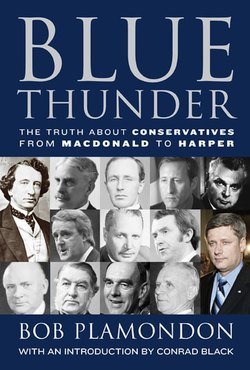Читать книгу Blue Thunder: The Truth About Conservatives from Macdonald to Harper - Bob Plamondon - Страница 3
На сайте Литреса книга снята с продажи.
INTRODUCTION
ОглавлениеBY CONAD BLACK
This is an invaluable analysis of the leaders and fluctuations of for tune of the Canadian federal Conservative Party (under different names) over 141 years, of what it needs to succeed, and why it has often failed.
The genius of Sir John A. Macdonald is generally conceded, but rarely laid out as clearly, and with such economy of words, as here. He won an astonishing six majority victories in general elections (after two in the pre-confederation, so called United Province of Canada), and was only defeated once.
The largely forgotten Sir Robert L. Borden was tortoise to Sir Wilfrid Laurier’s hare, and the two split four elections evenly.
In the eighty-five years from the retirement of Borden to the rise of Stephen Harper, Mr. Plamondon explains how two rather random events, and the generally high cunning of successive Liberal leaders, caused the Conservatives to lose eighteen of twenty-five general elections to the Liberals.
Borden, who was not at all anti-French, produced the first event when he imposed conscription for overseas service in 1917, out of his passionate loyalty to the Canadian army in France that was making such heroic sacrifices. This added only a few thousand reluctant warriors to the front lines, while the United States, which had just entered the war, was pouring over 100,000 soldiers a month into the Western Front, and steadily tilting the balance of forces in favour of the Allies. This enabled the supreme Allied commander, Marshal Foch, to launch his great offensive of August 8, 1918, which carried through to the German request for peace terms concluded on November 11.
For this gesture to the volunteer army, Borden, as he foresaw, destroyed the Conservative Party in Québec for two whole generations, as Liberal orators pilloried Tories as British colonialists happy to send French Canadians overseas to fight and die for Britain. In the twenty-five elections mentioned, the Conservatives won more MPs in Québec than the Liberals only three times, twice under Brian Mulroney, when the Conservatives finally elevated a Québec leader and ceased effectively to forfeit the significantly French-speaking third of the country’s constituencies before the election campaigns started.
The other successful election for the Conservatives in Québec had almost nothing to do with the Conservatives themselves. In 1958, Maurice Duplessis, the five-term premier and almost omnipotent “chef” of Québec, delivered fifty MPs to John Diefenbaker, to settle scores with the federal Liberals from when they had intervened against him in the Québec election of 1939. Apart from this windfall for the Conservatives, Brian Mulroney remains the only Conservative leader to defeat the Liberals in Québec in a federal election since Macdonald in 1891.
The second random event that squandered Mulroney’s party-building achievement and laid the federal Conservatives lower than they have ever been since Confederation, was the election of Kim Campbell as leader over Jean Charest, to succeed Mulroney. An attractive and capable woman, she had no idea how to lead a national party in an election and the Conservative caucus shrunk, in 1993, from 169 to two (not including the outgoing prime minister, whose next official position was consul general in Los Angeles).
The Reform Party took almost all Conservative support west of Ontario; the Bloc Québécois took all of what Mulroney had painstakingly built up in Québec; and the Liberals destroyed the Conservatives in Ontario and the Atlantic provinces. The Progressive Conservative Party was atomized and endured a futile decade of four more crushing electoral defeats while Jean Chrétien frolicked in the vacuum, until Stephen Harper and Peter MacKay reassembled the pieces yet again.
In this book, several obscure Conservative leaders, including John J. C. Abbott, J.S.D. Thompson, and the generally disparaged R. B. Bennett, emerge as having more merit and significance than is generally believed. And more familiar Conservative leaders, including Borden, Diefenbaker (whose strengths are indisputable but often hard to identify precisely), and Mulroney, are plausibly presented as more accomplished prime ministers than conventional opinion has generally held.
Robert Plamondon has performed an important service. He has shown that Canadian federal Conservatives are not just, as they have often appeared, a hodgepodge of disparate elements and political losers who don’t happen to be Liberals, and who receive a chance, which they squander, one election in four. And he has shown how the Conservatives can win federally and can regain the status, lost for nearly a century, of a natural party of government.
